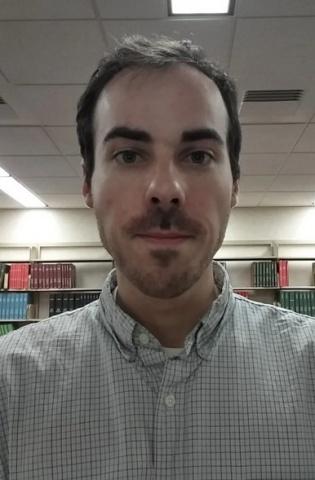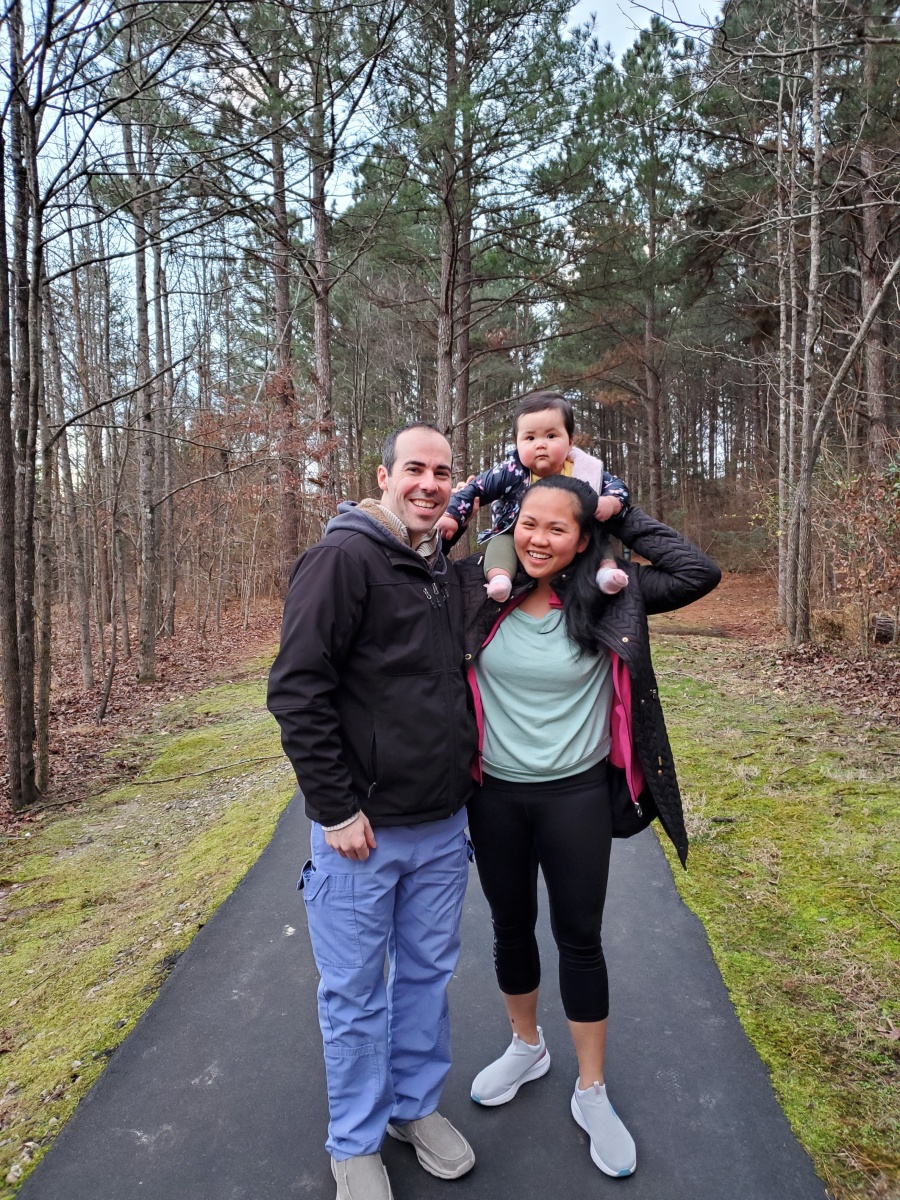
Cory Myers, DO, had a long-standing interest in the brain and neuroscience, considering research and psychiatry before settling on neurology. Now, as one of our clinical neurophysiology fellows, he’s preparing for a career treating patients with epilepsy and related conditions in the academic setting. For this week’s “Spotlight” interview, Myers talks to us about enjoying the variety offered by a career in clinical neurophysiology and epilepsy, how his mentor Aatif Husain, MD, disarmed Myers during his first week of fellowship with a pair of pink flamingo socks, and enjoying time with his wife and daughter when he’s not at work.
What are your current responsibilities as a clinical neurophysiology fellow? What does a typical workday look like for you?
My responsibilities as a clinical neurophysiology fellow are three-fold: interpretation of neurophysiologic tests, mainly electroencephalograms, EEGs, which are requested in outpatient setting and also in ICU and inpatient settings. Often the purpose of those tests is to look for seizure or seizure related activity or to clarify the nature of someone with altered mental status. I also help oversee care of epilepsy patients in the epilepsy monitoring unit, EMU, and see clinic patients with Duke epilepsy physicians during the week, usually in concern for seizure, or for management of intractable seizures.
Additionally every week there is an epilepsy surgery conference in which medication refractory epilepsy patients get evaluated for surgery at a chance for seizure-freedom, or if not eligible for resection possible neuromodulation therapies like VNS, RNS or DBS implantable device therapies. We gather clinical and neurophysiologic data and present in a format to help the department decide the best approach for the patient.
Twenty percent of fellowship is experiential learning of intraoperative neuromonitoring, IONM or IOM, which is a lesser-known niche in neurology, and has some overlap with anesthesiology. It is monitoring sensory and motor pathways for mostly neurosurgical patients usually from toe to head to make sure signals are maintained throughout the operation.
There are also inpatient and outpatient evoked potentials, which have historically been used for diagnosis of MS and have some clinical utility to this day, for example prognosis post-cardiac arrest. (We do EMG as part of IONM, but in a limited capacity compared to traditional EMG nerve conduction tests that neuromuscular specialists use for diagnosing conditions like ALS or myasthenia gravis.)
There is a research requirement as part of the fellowship as well and can be quality improvement or retrospective clinical studies. I'm getting involved in a research comparing expert reviewers to artificial intelligence at interpreting ICU EEGs. I'm also interested in a collaborative non-invasive brain stimulation research project with Dr. Chaatbar in the stroke department.
How and when did you first get interested in neurology?
I have had a long-standing interest in neuroscience and neurology as a subject. I think it may have stemmed from early life as a pre-teen from experience with vivid dreams and casual conversations about consciousness and perception from my dad's interest as a literary buff and writer. He often quoted both Henry and William James at breakfast or dinner. I enjoyed biology in high school, and I appreciated the bottom-up approach of neuroscience in undergraduate studies compared to psychology.
After undergrad, I considered research and PhD track as a career so I spent time feeling it out as a lab technician in Eric Kandel's neuroscience lab focusing on basic science of learning and memory dealing with mouse models. I had my earliest clinical exposure at a local hospital in a sleep lab where I saw EEG's performed overnight for sleep staging. I had a pretty wide interest and so I kept my mind open.
I thought about psychiatry and primary care during medical school, but kept gravitating back to neuroscience and neurology. Neurology patients tend to need a lot of primary care incorporated into their plans because neurologic conditions affect so many aspects of life. So I'm not missing out on an opportunity for primary care.
How did you decide to pursue clinical neurophysiology in particular?
Deciding to pursue clinical neurophysiology was a meandering process for me. During residency I was interested in a variety of subspecialties and entertained headache, neuroimmunology, or stroke. Each of these has very different scopes of practice and daily routines, outpatient clinic heavy or inpatient hospital-based.
I realized epilepsy and neurophysiology was like a way of deciding not to decide because there is overlap of most other subspecialties of neurology. I felt like seizures and epilepsy were a perplexing topic, so I wanted to learn more about them. Neurophysiology addresses patients with a variety of ranges of severity of disease, from unusual sensations or tingling to brain death, so the practice scope spans inpatient and outpatient settings depending on preference as well.
During epilepsy rotations I enjoyed a small break from clinical activities to focus on visual analysis of EEG and the sort of puzzle-solving process that goes into making sense out of the patterns observed. I find EEG interpretation kind of meditative, like looking at the borders of a mandala painting.
I also did a rotation in intraoperative neuromonitoring at my program director's suggestion, and found it fun and exciting, like playing jazz with neurophysiology in high-stakes operations because of the variety of arrangements of electrodes for each procedure. It's also like neurosurgery highlights, and it is a privilege to work with the neurosurgeons. For example some procedures for resections, the neurophysiologist becomes valuable once the brain is exposed to make sure no eloquent cortex is taken out. I am doing two years of fellowship in part to allow additional time to get extra procedural skills of IOM.
I am doing two years of fellowship in part to gain more experience with IOM in addition to more preparation to evaluate epilepsy surgical candidates. There is a trend nationally for adult neurologists who want to guide patients for epilepsy surgery to do two years of fellowship.
What plans do you have for your career after you complete your fellowship? If you could have any job in the world, what would it be?
I am interested in continuing to serve communities from an academic medical center. I enjoy the collegial environment of academic medicine and the constant prompting for additional learning. I came to the fellowship with the intention to look for jobs in academic medical centers and am in the early stages of that process. So my ideal job is similar to what my attendings at Duke are doing. They have a variety built into their schedule and round in the EMU for a week or two at a time and cover EEGs for the hospital. They also have clinic two or three days a week and usually cover IOM for one day a week.
There is a little administrative time and time dedicated to teaching and research. The week ends with surgery conference and meeting of the minds is routine. I have kept an open mind to telemedicine as an early career move because I am building a family and may have a second child, so working from home has appeal in the short term. A couple of fellows have done that and are very happy with their situation, so I am looking into it, too.
What’s one experience or aspect of the fellowship program that’s stood out as particularly memorable or helpful for you?
I originally came to the program because it is one of a few on the East coast that offers outstanding experience with both presurgical epilepsy surgery evaluations, and intraoperative neuromonitoring and evoked potentials. I read Dr. Husain's book as a primer during my IONM rotation in residency and my mentors at Georgetown wrote some of the chapters with him. He is world-renowned for both epilepsy and intraoperative neuromonitoring so I was interested to work with him.
We had a visiting scholar this year from Mexico who also came from even farther than I did to work with him, so I feel justified moving for the fellowship. Of course, the OR is huge and there are ample opportunities for IONM learning here as well. One of my first weeks of fellowship I had clinic with Dr. Husain and I will find it hard to forget his disarming pink flamingo socks as part of his otherwise very professional outfit for clinic. It has been a relief to have a relaxed culture for educational and professional development. The weekly IONM conference has been a very helpful addition to the other epilepsy education conferences.
I would be remiss not to mention Dr. Sinha, the program director's excellent mentorship during this year. He has been a very good model in all aspects of the career and field. I don't think I'll forget the time we did brain stimulation for seizure and eloquent cortex localization in a patient who upon hearing the term, Hertz for frequency of stimulation, became alarmed for pain as part of the procedure. He was very compassionate to avoid using the frequently used term and instead said "cycles per second" to assuage concerns and keep calm during the procedure.
What other passions or hobbies do you have outside of the Department?
My hobbies have shifted quite a bit because I have a new infant this year. I moved to Duke when she was 3 months old and she will turn one year old next month. I used to enjoy running for exercise and mental breaks. Now I have a jogger and enjoy strolls in the neighborhood wooded path and going to the playground.
During the summer I use the community pool for quick bursts of exercise. Otherwise I enjoy using the library app, Libby for audiobooks, and podcasts. I used to enjoy language, and studied Mandarin Chinese in college. But now I'm learning Tagalog from my wife with my baby girl.
